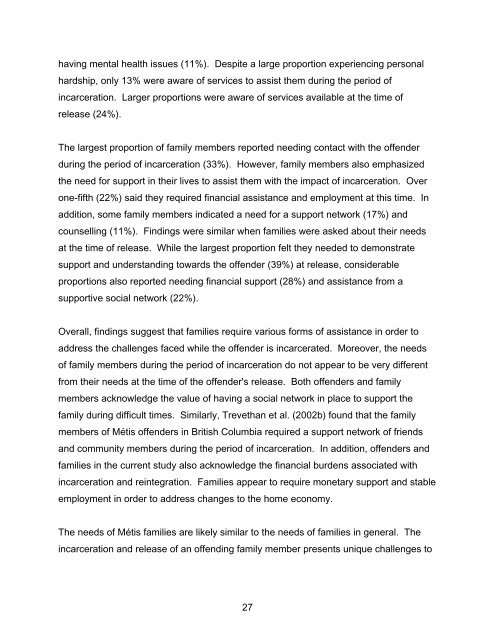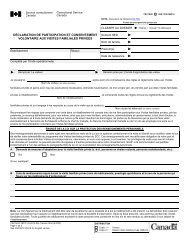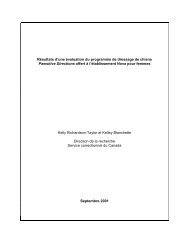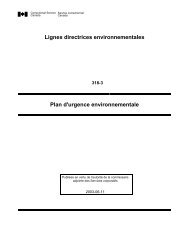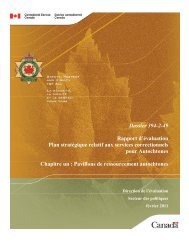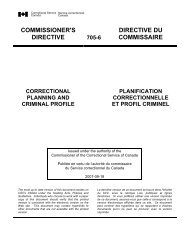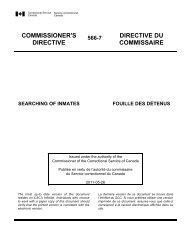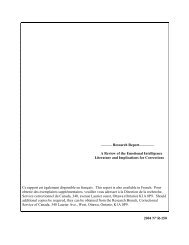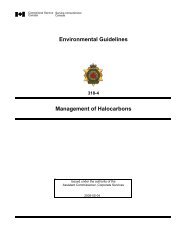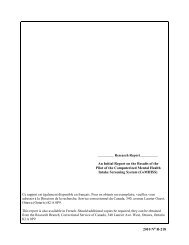Program and Service Needs of Federally Incarcerated Métis ...
Program and Service Needs of Federally Incarcerated Métis ...
Program and Service Needs of Federally Incarcerated Métis ...
Create successful ePaper yourself
Turn your PDF publications into a flip-book with our unique Google optimized e-Paper software.
having mental health issues (11%). Despite a large proportion experiencing personal<br />
hardship, only 13% were aware <strong>of</strong> services to assist them during the period <strong>of</strong><br />
incarceration. Larger proportions were aware <strong>of</strong> services available at the time <strong>of</strong><br />
release (24%).<br />
The largest proportion <strong>of</strong> family members reported needing contact with the <strong>of</strong>fender<br />
during the period <strong>of</strong> incarceration (33%). However, family members also emphasized<br />
the need for support in their lives to assist them with the impact <strong>of</strong> incarceration. Over<br />
one-fifth (22%) said they required financial assistance <strong>and</strong> employment at this time. In<br />
addition, some family members indicated a need for a support network (17%) <strong>and</strong><br />
counselling (11%). Findings were similar when families were asked about their needs<br />
at the time <strong>of</strong> release. While the largest proportion felt they needed to demonstrate<br />
support <strong>and</strong> underst<strong>and</strong>ing towards the <strong>of</strong>fender (39%) at release, considerable<br />
proportions also reported needing financial support (28%) <strong>and</strong> assistance from a<br />
supportive social network (22%).<br />
Overall, findings suggest that families require various forms <strong>of</strong> assistance in order to<br />
address the challenges faced while the <strong>of</strong>fender is incarcerated. Moreover, the needs<br />
<strong>of</strong> family members during the period <strong>of</strong> incarceration do not appear to be very different<br />
from their needs at the time <strong>of</strong> the <strong>of</strong>fender's release. Both <strong>of</strong>fenders <strong>and</strong> family<br />
members acknowledge the value <strong>of</strong> having a social network in place to support the<br />
family during difficult times. Similarly, Trevethan et al. (2002b) found that the family<br />
members <strong>of</strong> <strong>Métis</strong> <strong>of</strong>fenders in British Columbia required a support network <strong>of</strong> friends<br />
<strong>and</strong> community members during the period <strong>of</strong> incarceration. In addition, <strong>of</strong>fenders <strong>and</strong><br />
families in the current study also acknowledge the financial burdens associated with<br />
incarceration <strong>and</strong> reintegration. Families appear to require monetary support <strong>and</strong> stable<br />
employment in order to address changes to the home economy.<br />
The needs <strong>of</strong> <strong>Métis</strong> families are likely similar to the needs <strong>of</strong> families in general. The<br />
incarceration <strong>and</strong> release <strong>of</strong> an <strong>of</strong>fending family member presents unique challenges to<br />
27


